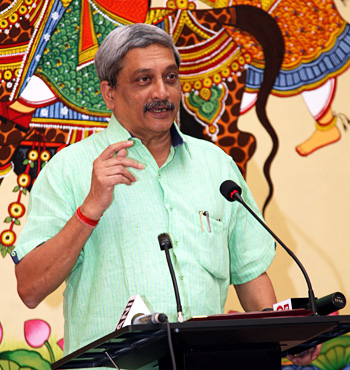INDIAN ARMED FORCES CHIEFS ON
OUR RELENTLESS AND FOCUSED PUBLISHING EFFORTS

SP Guide Publications puts forth a well compiled articulation of issues, pursuits and accomplishments of the Indian Army, over the years

I am confident that SP Guide Publications would continue to inform, inspire and influence.

My compliments to SP Guide Publications for informative and credible reportage on contemporary aerospace issues over the past six decades.
- Interim Defence Budget 2024-25 — An Analysis
- Union Defence budget 2024
- Indian Army: In quest of greater firepower and policy recommendations for gaps
- Indian Army Annual Press Conference 2024
- 6G will transform military-industrial applications
- Tata Boeing Aerospace Delivers 250 AH-64 Apache Fuselages, Manufactured in India
New Tri-Service Commands — how effective will they be?
 |
By Lt. General P.C. Katoch (Retd) Former Director General of Information Systems, Indian Army |

As per media reports, Defence Minister Manohar Parrikar on August 19 has directed HQ IDS to "work out and fine-tune" the "basic structures" for the Cyber, Aerospace and Special Operations Commands. In headline blaring 'Govt gets cracking on three new Tri-Service Commands' media said the Modi government has finally got cracking on the long-pending proposal to create three new tri-Service commands to handle the critical arenas of space, cyberspace and clandestine warfare in the form of Special Forces.
Detailed notes for the three commands, with presentations and timelines, have reportedly been exchanged between HQ IDS and MoD a couple of times. The media further reports that "It will take another year or so for the commands to be created" while quoting government source in saying, "The new commands will, of course, not be set up in one go. They will come up in a phased manner depending on availability of funds...the accretion of manpower will also be progressive." It is not unusual for the media to periodically create euphoria that something is being done in double quick time, perhaps at behest of the bureaucracy, where actually a case for it does not exist. Looking at the status of the Mountain Strike Corps, rapid expansion of the Special Forces in sharp contrast to global norms diluting their combat potential, grossly underequipped under equipped military, by the time these three commands come up and are somewhat operational a period of 7-10 years may be needed, if not more. Exchanging notes with HQ IDS is one issue but what eventually comes up depends on the bureaucracy and the bureaucratic advice given by the bureaucrats to the political masters. More important is the question in what shape these new Tri-Service Commands will come up and how effective they will be? Take a look at the two Tri-Service Commands that we already have. The Andaman & Nicobar Command (ANC), the only Theatre Command set up 14 years back in 2001 has little teeth contrary to what was envisaged by the Kargil Review Committee (KRC) and follow up GoM reports.
The focus on ANC remains insufficient even today despite aggressive Chinese designs and movement in IOR with China stepping up bases, acquiring islands, nuclear submarines prowling the waters and plans to reclaim reefs and land akin to what she engaged in ECS and SCS. Even the Navy's case for a Marine Brigade has been languishing with the government for the past decade and a half. The Strategic Forces Command (SFC) set up in 2003 to handle the country's nuclear arsenal was placed under HQ IDS as recommended by the KRC and follow up GoM reports, with the nuclear button with the Prime Minister presiding over the Nuclear Command Authority (NCA). However, over the years, HQ IDS and the even the Chairman COSC have quietly been taken out from the nuclear loop, placing the SFC directly under the NSA without any discussion with the military. When Pranab Mukherjee was Defence Minister (now President), he was told by the then Chairman COSC in a tri-Service forum in the INCP that with this arrangement, even the Chairman COSC was not aware of what would be India's response in case of a nuclear strike. The reason for such change is obvious — bureaucratic advice blindly followed by the polity. The problem in India always has been that the civilian control of the military has boiled down to bureaucratic control, not political control which it should be. The three new Tri-Service Commands are what the Naresh Chandra Committee had recommended. But much before this committee was set up, the news about setting up an Aerospace Command had gained momentum during 2004-2005 with as much media hype but was quietly buried. Satellites for surveillance, communications, early warning about missiles, precision targeting etc are vital for this command. Presently, only Rukmini (Navy's GSAT-7) is operational, which was launched in 2013. Understandably, military satellites would be prime targets for China's anti-satellite weapons. The military has deliberately been kept away from the nascent cyber warfare program in India even as the cyber warfare programs of USA and China are steered by the US Military and PLA respectively.
So it should not be surprising that as and when the Cyber Command comes up, it will be left in isolation with some perfunctory links to NTRO. As to the Special Forces Command, India needs Special Forces in two tiers, both complementing each other's tasks; first tier under the military for employment at tactical level to support the military and second tier under the highest political authority for employment at strategic level through politico-military missions. India required a CDS with full operational powers 10 years back but is likely to get a Permanent Chairman COSC without any operational powers because of bureaucratic skullduggery. Latter will unlikely be able to right the appalling state of synergy in the military. It is quite possible that all the Special Forces effort will be put under the Permanent Chairman COSC who doesn't have any worthwhile powers. So the question remains what shape these three commands will come up, in what time-frame and how effective would they be?





